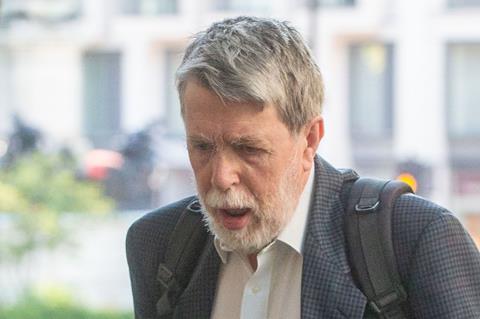Gareth Jenkins, the Fujitsu engineer whose evidence was crucial to at least a dozen sub-postmaster prosecutions, begins four days of oral evidence to the Post Office Inquiry
4.20pm: Not going to lie, there has been a fair amount of technical discussion that has resulted in this afternoon's session ending up a little dry. Jenkins is clearly very comfortable discussing these aspects rather than the legal side. The inquiry has now wrapped up for the day and Jenkins will return tomorrow, where he will be asked about what changes and additions were made by Post Office lawyers to his witness statements. It is fair to add from his witness statement that he concluded with an apology to those convicted based on his evidence.
He said: 'I would like to make clear that I feel deeply affected by the cases I played a part in. I have wanted to explain my part in them. I have apologised to those individuals who were wrongly convicted in the case studies I have addressed and I repeat again how sorry I am.'
3.40pm: Beer moves on to the issue of bugs, efforts and defects (which we'll refer to bugs for ease). Jenkins admits he was aware of the attitude in Fujitsu that they could 'live with' some bugs so long as they did not disrupt the system to any material extent. These bugs were not always thoroughly investigated but did not affect individual branches, says Jenkins.
Inquiry then goes into detail about the nature and scope of the Horizon system. Beer says he wants to start low down and asks what a node is. Jenkins appears to stumble, prompting Beer to say: 'This is not a good start.' Big laugh in the public gallery.
3.30pm: Beer reminds Jenkins that Tatford's oral evidence was that he spelt out the expert's duties to the court. 'Did Mr Tatford make clear to you the duties that he spoke about?' asks Beer.
'I don't believe he did.'
3.20pm: Back after a short break, and Beer asks whether Jenkins saw barrister Tatford give evidence to the inquiry last year. Jenkins reveals he was in the room to hear it.
Tatford said in his evidence to the inquiry he made it very clear to Jenkins that he was under a duty to provide a frank disclosure of Horizon problems to the Misra defence expert.
'I don't believe we had that sort of conversation,' says Jenkins. He clarifies that he did not understand from Tatford there were disclosure obligations. 'His [Tatford's] evidence is in error?' asks Beer.
'That is not my understanding of what occurred at the time,' says Jenkins.
3pm: More big revelations now. In October 2010, Jenkins emailed a draft witness statement to prosection lawyers Warwick Tatford and Jarnail Singh, and investigator Jon Longman. He used the same template as he had for all previous witness statements. He specifically asked for their feedback as to whether it was correct in terms of the approach and style. Jenkins says in his written statement: 'No one suggested that I needed to add any sort of expert declaration to it. Mr Tatford made comments on this draft... He appeared to want me to make some points more strongly in favour of POL than I had done. In particular, he wanted me to say that it looked as though Mrs Misra had stolen money rather than that it was incompetence.'
Jenkins refused this particular request. He says he felt uncomfortable at what he was being asked to do and accepts now it was 'probably totally inappropriate'.
2.50pm: Jenkins agrees his witness statement in the Misra case gave only a 'partial picture' but insists he was only asked to comment on a limited number of issues. He did not realise at the time that he should disclose his knowledge of other bugs in the Horizon system as he did not think they applied to Misra's branch at the relevant time.
'If someone had told me I need to do something about [other bugs] I would have done something about it,' he says.
Was he ever concerned about Post Office lawyers asking him to amend his statement and the evidence he was giving?
'I thought everything was just a legitimate tidying up of the statements to make them more readable,' Jenkins says.
2.35pm: The defence expert in the Wylie case made a specific declaration that nothing was in their report which had been suggested to him, including by his instructing lawyers.
Jenkins admits he could not make any such declaration, adding: ‘There were comments made in my report by the lawyers and I actually changed things as a result of some of those comments. I didn’t realise there was anything wrong with doing that.'
Beer says we will come onto this in detail tomorrow.
2.30pm: Beer goes to another case, that of Kim Wylie, an accused sub-postmistress from Winlaton in the north east. Again the defence witness set out a lengthy explanation of their credentials, the caveats and limits to their report and the declaration of independence. Jenkins annotated this statement and wrote under the declaration: 'Standard stuff. No comment required.'
He now tells the inquiry he just saw it as a declaration which was standard, and not the words within it. He was trying to comment on Horizon and no-one told him of any of the duties of an independent expert witness.
'I hadn't really taken much notice of it and didn't really think any of that applied to me,' he says. 'I was not making such a declaration.'
2.20pm: We are now looking in detail at how Jenkins approached giving evidence in the Seema Misra trial in 2010. Misra, who is present today, was jailed after a trial whilst she was pregnant with her second child. The conviction was based on oral evidence from Jenkins. He tells the inquiry he believed he was acting as an employee of Fujitsu whilst the defence expert was a 'totally different person'. Beer asks why it did not register with him why he should not be providing the same detail and credentials as the defence expert had set out in his witness statement.
Jenkins says: 'I didn't ask anybody. Perhaps I should have done but I didn't.'
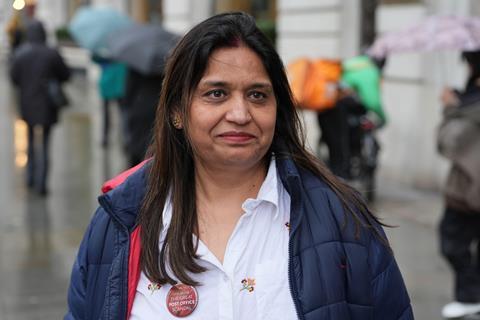
2.10pm: And, we're back. Jenkins says he felt like part of the prosecution team because that was how Post Office treated him.
Beer shows him a defence expert witness statement which set out in detail their relevant experience and duties to the court. Jenkins says it did not occur to him at the time that he was expected to provide the same.
Jenkins tells the inquiry 'I was basically doing what I had been asked to do which was to comment on the report and then it was suggested that it was presented in terms of a witness statement. So that's what I did.'
1.10pm: Beer asks if Jenkins understood that he was subject to the duties imposed on him as an expert witness, including details of disclosure duties. Jenkins says he did not, and whenever he referred to himself as an expert witness it was because he believed he was an expert who was being asked for an opinion. When he did ask for clarification about what his duties were, he got what Beer describes as an 'asinine' reply. He insists he had no proper guidance from anyone at Post Office about what his responsibilities were to the court.
We now go to lunch.
12.55pm: A colleague of Jenkins complained about a direct approach from an external solicitor to him in November 2012 for information on a case. This colleague said it was 'clearly unacceptable that he is being ambushed in this way'. Jenkins wrote to Post Office executive Angela van den Bogerd the following January that another approach was outside his official remit, adding: 'I probably shouldn’t be doing this investigation for you in this way.'
12.45pm: Jenkins was concerned enough about direct approaches from Post Office and its lawyers about what he should say that he sent this email to Rachael Panter, from Cartwright King, asking for this to stop.
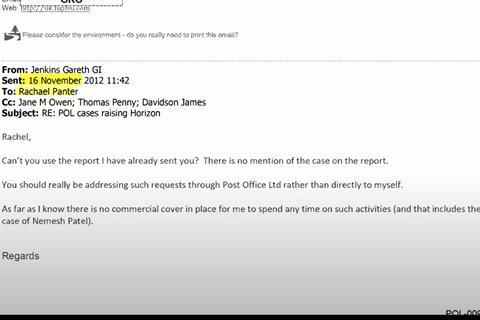
12.40pm: Beer asks, given that Jenkins has repeated that he was not the Horizon architect, why he was always called on to give expert evidence. He says he doesn't know. He was never formally told by Fujitsu it was part of his job, although it became that way over time.
Beer asks if money came into it, but Jenkins says he was getting paid whether or not he supported prosecutions.
Beer then asks whether Jenkins ever felt under pressure from Post Office or its lawyers to push the reliability of Horizon whenever defence lawyers raised this.
He replies: 'There were certainly cases where they were trying to put words in my mouth which I didn't want to say... I just took it as being the way these things happened.'
12.35pm: We're back. Still not a great deal of focus on the role of lawyers, but that will surely come, given Jenkins' written statement talks repeatedly about the Post Office's legal team.
In one section, he says: 'On occasions the way cases were conducted seemed last minute and chaotic. I had specific difficulties with Jarnail Singh and his approach. There were a number of occasions when I had to ask POL's lawyers for clarification of exactly what POL wanted me to do or details of the Horizon-related issues being raised by the defendant. I also felt that POL's lawyers resisted obtaining audit data in some cases.'
12.15pm: Jenkins was ultimately not called as a witness in the Castleton case, although he continued to advise on aspects of Horizon. Dilley had said that although Jenkins would make a good witness, he would not be called for evidential reasons. Jenkins replied in an email: ‘Fine (I won’t try and understand what this means!)’
He repeats that at this stage he did not understand the role or duties of an expert witness and these were never explained to him.
Chambers ultimately was called as a witness and Jenkins agrees with Beer’s suggestion she was ‘extremely reluctant’, adding: ‘She certainly didn’t feel very comfortable with it.’
The inquiry goes to another morning break.
12.10pm: Jenkins' colleague Anne Chambers was asked to supply him with some of the data as requested by lawyers, while he would 'front up' the evidence she helped to produce. In her email to him, Chambers admitted: 'I don't really know what I'm doing!'
12pm: Inquiry hears that Jenkins met at Fujitsu HQ with Bond Pearce lawyers including Stephen Dilley in 2006 to discuss the Castleton case. Jenkins says he has no recollection of the duties of an expert witness being discussed at this meeting. Dilley emailed a couple of days later to say that Castleton's lawyers were making disclosure requests for error records that were a 'stab in the dark'. Jenkins was asked for his opinion and the defence was 'clutching at straws'. He reiterates that he had never been made aware of his duties as an expert witness at this stage.
11.50am: Jenkins responded to a request for his input on the Castleton case by saying there was nothing wrong with Horizon, a system which simply reflected the information entered onto it.
He added that the ‘most likely’ explanation for money being missing on the Bridlington branch account was ‘miss-operation or fraud’, although he accepted this was not sufficient for a prosecution. The Post Office later reported that Jenkins had not commented on whether there had been human error involved, which was not ultimately correct.
Jenkins tells the inquiry he did not then understand the difference between a civil and criminal court, and did not understand what the purpose of civil proceedings would be. He says when he speculated there may be fraud or mis-operation by Castleton this was ‘fairly loose language’.
11.40am: Another key part from Jenkins' witness statement: 'I deny any wrongdoing in relation to the evidence that I gave in any of the case studies being considered by this Inquiry. I now know that I gave evidence without understanding that I might be subject to "expert duties" (depending upon the sort of evidence I was giving). I also thought that I could trust the way in which POL lawyers conducted these cases and that, in turn, my approach was appropriate and correct.'
11.35am: The inquiry sees a letter from Bond Pearce (now Womble Bond Dickinson) setting out the duties of an expert witness ahead of the Castleton case.
But then a revelation: Jenkins says he has no recollection of ever receiving this letter and does not recognise any of it. He says he was not made aware of the duties of an expert witness until late 2020 when a police investigation into his conduct was commenced.
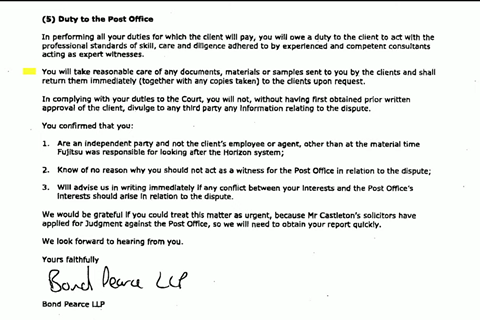
11.25am: Back after a short break, and Beer goes to the case of Lee Castleton, the Bridlington sub-postmaster taken to court by the Post Office over the £27,000 apparently missing from his branch account. He was ordered to pay £300,000 Post Office legal costs after losing his case in the Royal Courts of Justice in 2006.
Jenkins was instructed as an expert witness in the case and the inquiry sees documents showing that his duties were set out in detail.
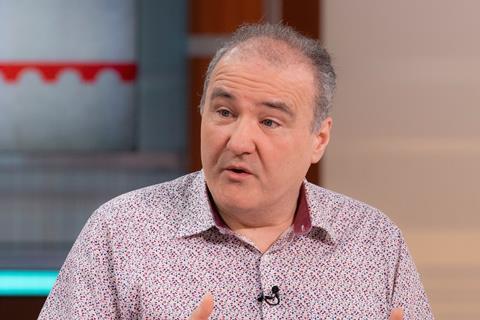
11am: Jenkins’ written statements provide damning claims about the role of lawyers involved in cases in which he gave evidence. Jenkins claims that his draft witness statement for a case in October 2012 was revised and given back to him to sign. The amendments included someone adding the words: ‘I understand that my role is to assist the court’. Jenkins says he would not have put this sentence in, and explains that in-house Post Office solicitor Jarnail Singh appeared to have put his draft statement into a witness statement format.
Jenkins says that another lawyer, former Cartwright King associate Martin Smith, deleted part of his draft witness statement as it would prompt the defence to ask for copies of reports on Horizon integrity.
10.45am: Trawling through Jenkins’ statements and one section stands out: the Post Office’s decision to stop using Jenkins as an expert witness in 2013 based on the Simon Clarke advice (see the 9.30am entry). Jenkins writes that he cannot recall anyone from Post Office or Fujitsu explaining the reasons for him being dropped.
Remarkably, he does even not recall seeing any written legal advice or having it explained to him, adding: ‘I first became aware of the criticisms made of me in Mr Clarke's advice during the appeals against conviction in the Court of Appeal in 2020.’
10.35am: Jenkins denies, as has been claimed before, that he was the chief architect of Horizon. His five witness statements, by the way, have been published on the inquiry website and can be found here:
- https://www.postofficehorizoninquiry.org.uk/evidence/witn00460100-gareth-jenkins-first-witness-statement
- https://www.postofficehorizoninquiry.org.uk/evidence/witn00460200-gareth-jenkins-second-witness-statement
- https://www.postofficehorizoninquiry.org.uk/evidence/witn00460300-gareth-jenkins-third-witness-statement
- https://www.postofficehorizoninquiry.org.uk/evidence/witn00460400-gareth-jenkins-fourth-witness-statement
- https://www.postofficehorizoninquiry.org.uk/evidence/witn00460500-gareth-jenkins-fifth-witness-statement
10.30am: Beer asks how Jenkins became so involved as an expert witness. He says he was seen as able to turn some of the technical jargon into something that lay people could understand better. Yet he was not told about all the reported issues with Horizon and does not appear to have been given an overall picture.
Beer asks: 'Did anyone say "we need to make sure that Mr Jenkins knows about the things that are not referred to him"?' Jenkins says this never happened.
Beer continues: 'Did it occur to you "I might need before going to court to find out about things that are not referred to me"?'
Jenkins: 'That didn't occur to me. I was confident and probably wrongly so that when problems did occur they were quickly fixed... with hindsight I would have done things differently.'
10.20am: The inquiry is focusing on Jenkins' knowledge of bugs, errors and defects in the Horizon system. Beer establishes that there was no formal system in Fujitsu for sharing information about these glitches, and Jenkins did not have oversight of the bugs, errors and defects. He would only become aware of issues through happenstance when serious incidents were reported to him. Beer asks how Jenkins could accurately give evidence to a court about the existence of bugs when his knowledge was based on happenstance. He says he was generally confident in the way the system was operating, and he did not realise at the time he needed to do more research.
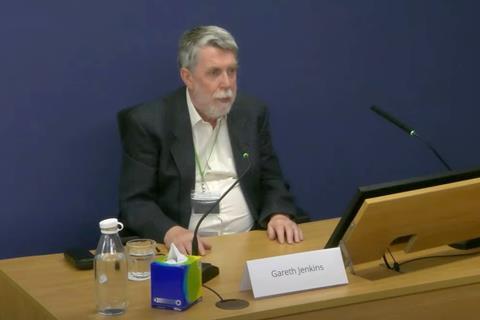
10.05am: A brief moment of light relief as a fly appears to be flying around Jenkins and distracting him. Beer says he will have it removed if it keeps causing disruption.
Then more serious business. Beer goes to the ruling of Mr Justice Fraser in 2019 in the group litigation which was heavily critical of Jenkins and his Horizon system. Do you accept that Mr Justice Fraser found Horizon was not remotely robust, asks Beer. 'I accept that was what he said,' replies Jenkins.
Was Horizon Online susceptible to accounting flaws?
Jenkins: 'I think [Fraser] is maybe putting it too strongly. Horizon Online was and is doing a good job in terms of its accounting.'
Does he actually believe the judge's ruling about Horizon not being robust?
Jenkins: 'I don't accept that finding. There were some discrete bugs that caused problems to the accounts but they were very discrete and I believe they were well controlled and managed at the time.'
9.55am: The inquiry looks firstly at Jenkins' background. He graduated from Cambridge University in 1973 and worked for his entire career at Fujitsu (or its predecessor company) until he retired in 2015. He always held a technical role rather than managerial. He worked on Horizon Online from 2008 to 2015 and worked with Post Office analysts in defining the technical requirements for the system. Jenkins was also retained as a consultant by Fujitsu until 2022, although he largely stopped working in 2020 after the Horizon group litigation.
9.45am: A real air of anticipation in the inquiry room as we wait for Jenkins to arrive. All the major broadcasters are here and preparing lunchtime bulletins. The public gallery is near to full – the biggest attendance since Paula Vennells. Seema Misra, the sub-postmaster convicted on Jenkins’ evidence, is here. Jenkins arrives to total silence and inquiry counsel Jason Beer KC is ready to go.
9.30am: The inquiry is back, featuring the individual mentioned more than any other during the last year of evidence: Fujitsu engineer and Horizon specialist Gareth Jenkins.
He was the Post Office’s go-to expert witness for many years, writing statements in at least 15 cases and giving oral evidence in one: that of Seema Misra in 2010 (this trial will be a key focus of the hearing this week). He continued to be relied on by the Post Office until the Simon Clarke advice in 2013, which concluded that Jenkins had known about bugs in the Horizon system but not disclosed them. Clarke found that Jenkins ‘failed to comply with his duty’ as an expert witness and that his credibility was ‘fatally undermined’.
But questions remain about Jenkins, who is a core participant and has been represented throughout the inquiry: how much did he know about flaws with Horizon, what (if anything) did he tell the lawyers handling prosecutions, and what was he told (again, if anything) about his duties? The coming days should provide some answers.
